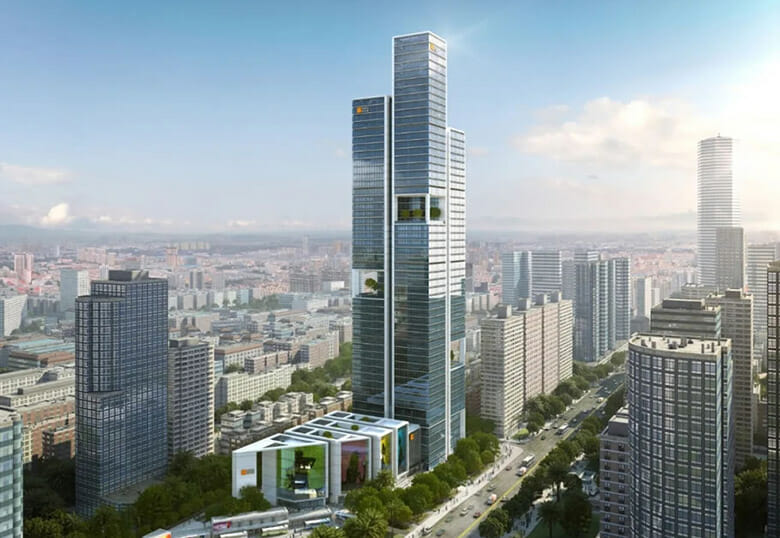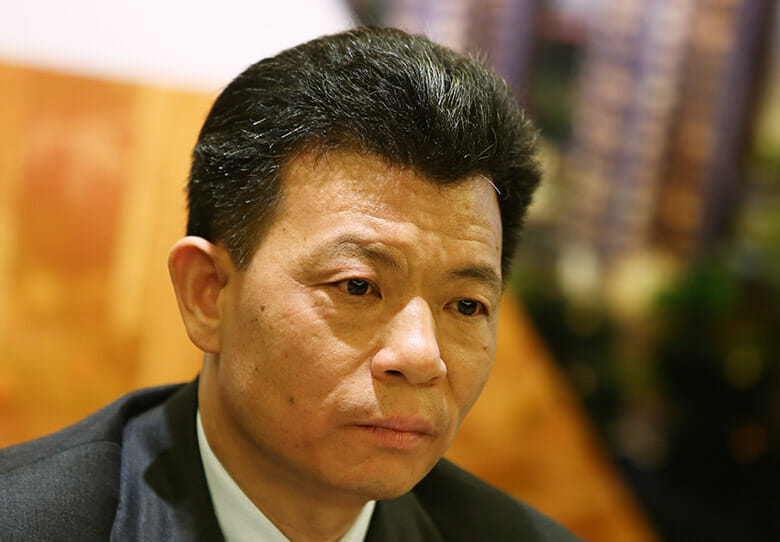
The Kaisa Fintech Centre in Shenzhen’s Futian district is now part of CITIC’s portfolio
Kaisa Group, the second-largest US dollar bond issuer among Chinese property developers after China Evergrande, appears to have found its white knight.
State-run Chinese conglomerate CITIC, a main creditor of the cash-strapped developer, has taken over stakes in five Kaisa projects in Shenzhen worth more than RMB 60 billion ($8.9 billion) as part of a debt restructuring, with the renamed projects now appearing on the official WeChat account of the southern China office of CITIC Urban Development & Operation.
The deal calls for CITIC to finish construction and take on marketing of the properties, which include a theme park, a residential compound and three mixed-use complexes measuring a total of over 2.7 million square metres (29 million square feet) of gross floor area. Kaisa owes CITIC over RMB 10 billion but has an option to buy back the assets after paying off its overdue accounts, according to a report by business news outlet Caixin.
With Kaisa having first defaulted on its offshore debt in December of last year, the developer is said have been conducting debt restructuring negotiations with CITIC since April, with the process now having been completed.
Properties Renamed
During the last two weeks CITIC has taken over the Kaisa Fintech Center, a combined office and retail complex in Shenzhen’s Futian district valued at RMB 8.2 billion, which it has renamed as the CITIC Chengkai Tower.

Kaisa Group chairman Kwok Ying-shing has parted with over 2.7 million square metres (Source: Getty Images)
Also finding its way onto CITIC’s balance sheet is Kaisa’s RMB 29.8 billion Dongjiaotou shanty town project in Nanshan district, a commercial and residential development which is now known as CITIC Dongjiaotou.
Next on the list is Kaisa Golden Bay Resort a RMB 10.6 billion theme park project incorporating 333,910 square metres of hotels, retail and residential space, where CITIC took over Kaisa’s 51 percent stake and renamed the development CITIC Chengkai Golden Bay Resort.
Shenzhen Kaisa City Plaza a RMB 11.8 billion complex composed of residential, hotel office, retail and serviced apartments in Longgang district is also now under CITIC’s ownership and the state-run giant has also taken over Kaisa Oceanus Mangrove Bay, a 66,700 square metre residential project in Futian district which is now known as CITIC Chengkai Mangrove Bay.
Anatomy of a Bailout
Under the terms of the deal, Kaisa Fintech Center was sold to CITIC while the other four projects were handed over in a debt swap arrangement, Caixin said, citing an informed source.
A special purpose vehicle (SPV) company, Chengkai Xin Yin, was registered on 17 June with directors from both CITIC and Kaisa on its board. Chengkai Xin Yin subsequently took over Kaisa’s 51 percent stake in the Golden Bay Resort as well as nearly all of its 70 percent stake in Shenzhen Oceanus Group – the developer of the Oceanus Mangrove Bay project, which also owns 51 percent in the Dongjiaotou shanty town project.
On June 22, Chengkai Xin Yin became 100 percent owned by Western Trust Co Ltd. Through an agreement with Western Trust, China CITIC Bank earns income from these projects.
CITIC Urban Development & Operation, a wholly-owned subsidiary of CITIC Group, is taking over construction and operation of the projects while China CITIC Bank will provide funding support including as maturity extensions for existing liabilities, cancellation of debt, and the provision of new loans to ensure the completion of the projects, according to Caixin.
New loans from China CITIC Bank as well as the sales proceeds will be deposited into an account supervised by the government, and are to be used for project construction and the repayment of Kaisa’s wealth management products. Any remaining funds will be used to repay loans from the bank first, and then to resolve other debts associated with the projects.
Dubbed the “King of Urban Renewal” by Chinese media, Kaisa has some 200 urban renewal projects across China, generating over one-third of the group’s revenue, with 120 in its home city of Shenzhen, where home prices are among the highest in the country.
Default Realities
Like Evergrande, Kaisa has suffered a blow from China’s clampdown on housing bubbles and excessive borrowing. It failed to make payment on wealth management products last November and said in December it had defaulted on four dollar bonds.
All but the Mangrove Bay project were included in a list of 18 Shenzhen developments that Kaisa put up for sale last November as it began scrambling for cash.
In its race to avoid default, Kaisa last November sold its stake in a residential site on Hong Kong’s former Kai Tak airport runway for HK$7.9 billion to a joint venture between New World Development and Far East Consortium. It is also selling its Shanghai headquarters building for RMB 2.9 billion to container shipping company Zhonggu Logistics, with China Life acting as an intermediary, according to an announcement by Zhonggu last month.
Trading in Kaisa’s Hong Kong-listed shares has been suspended since 1 April after the developer failed to publish its audited 2021 financial statements by the 31 March deadline, citing the impact of the Covid-19 pandemic.
In moves that have caused market concerns about the company’s financial condition, Kaisa on 20 June 20 announced the resignation of its chief financial officer and on 27 June named a new auditor. No timetable for publication of its audited 2021 results has yet been given.
Distress Specialist
The deal with Kaisa represents the latest instance of CITIC, which was founded in 1979 and ranks as China’s largest conglomerate, taking over failed high profile projects.
In October 2015, it acquired a 40 percent stake in Chinese developer Advanced Business Park’s Royal Albert Docks regeneration project in east London after that development backed by then-mayor Boris Johnson stalled from lack of customers.
Then in April 2018, took on a 49 percent interest in a joint venture with debt-laden private conglomerate CEFC China Energy which gave it control over the controversial energy firm’s assets in the Czech Republic after CEFC chief Ye Jianming was detained on corruption charges and his firm went into bankruptcy.
CITIC previously came to Kaisa Group’s rescue in 2015 after the developer’s projects were locked up by the Shenzhen government as part of a corruption investigation causing Kaisa to default on a $26 million dollar bond.
CITIC and Ping An gave Kaisa a lifeline by offering a RMB 30 billion loan and a RMB 50 billion loan, respectively, that helped pay off its debt.
Leave a Reply